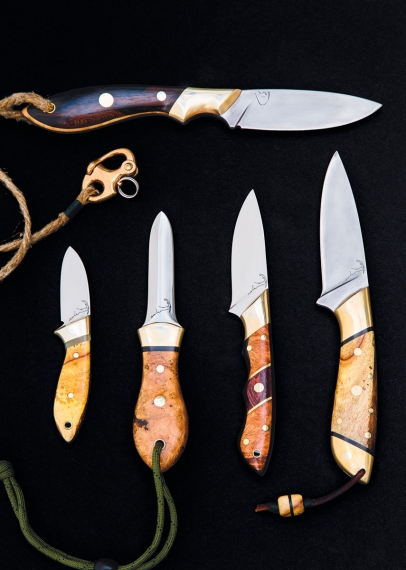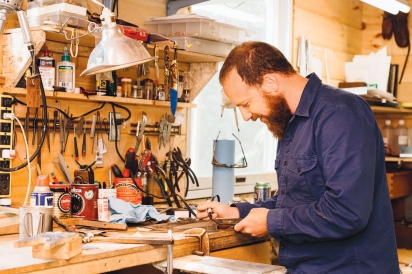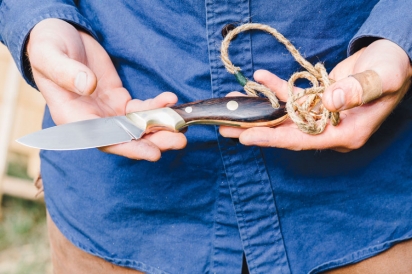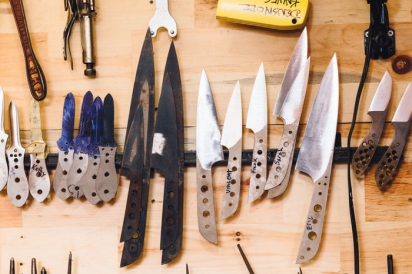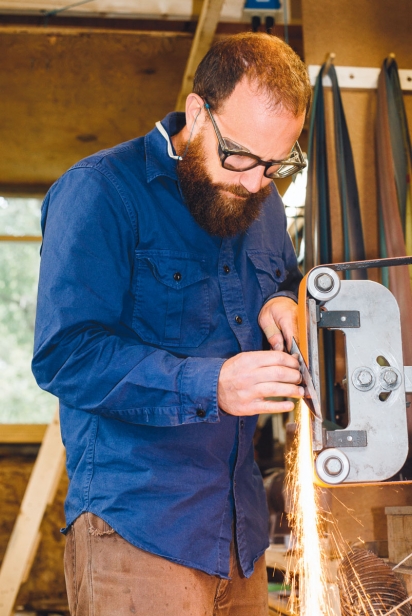Densmore Knives: Custom Crafted with Care
Sam Densmore of Densmore Knives comes from generations of artists and craftspeople. Some of the wood he uses in the handles of his meticulously handcrafted knives came from his grandfather, who carved wooden spoons, and many of his tools and the skills to use them were inherited from him and two other grandfathers. Densmore could be described in much the same way as he describes his grandfather: “One of those people who knows how to do things.” He is the third generation of his family to live and work in Woods Hole.
In the workshop he built with his father, Densmore sketches and conceptualizes the designs for each knife he makes. There he profiles and grinds the blades; cuts, polishes and pieces together the wooden handles; and custom makes the lanyards and sheaths. Each knife is finished with his signature “D” etched onto one side of the blade and the shape of Cape Cod on the other. Every handle is a unique combination and design of exotic, local and/or repurposed wood, accented and held together with brass pins. His knives are custom-made works of art, which is why he only made 85 last year.
The only part of Densmore Knives not done in his workshop is heat treating the blades—a high heat process that hardens and strengthens the metal—which is done before Densmore grinds and sharpens the blade a final time and creates the knife’s handle. His knives do not come quickly or cheaply, but customers come to him for an heirloom that they can use, display and pass on to the next generation. Kitchen knives range from $150-$500 and sheath knives start at $300.
The utility is of equal importance to the beauty of Densmore Knives. “It’s hard to sell a painting, but everyone uses a knife every day, multiple times, probably, so it’s an easier sell. It’s functional and it looks nice and it’s custom,” Densmore says. He worries about pricing people out, but it would be hard to lower the price point with the materials, craftsmanship and time that go into the knives. He estimates that a paring knife would take about eight hours to make if he worked straight through on it (which he does not), and anything more complicated or with a sheath would take days.
Densmore received his first pocketknife as a kid, and got interested in carving wood and collecting more knives. He made his first knife in high school with a family friend who bought blades and put handles on them. Densmore soon wanted to see if he could make his own blades. Densmore Knives has been his full time occupation for three years now. Before becoming a knife maker he made leather shoes and built bicycles. “I’ve always been interested in making things,” he says. “I like looking at an object and trying to figure out how it was made and what the materials were and what process it took to make the thing and if I could do it or if it’s worthwhile or something I would enjoy [making].” Knife making enables him to work with his favorite materials: leather, wood and metal.
Densmore enjoys the interaction and collaboration with customers. His process begins with many emails back and forth to lock in the knife’s design, which depends on its purpose and who it is for. Since every aspect of each knife is hand crafted, the options are limitless. Once the general design is decided, most customers trust Densmore to the aesthetic details. Besides the wood types and design of the handles, other custom details have included hand carved wooden beads on the lanyards, painted sheaths, custom etched designs in the blade, birthdates, names and initials carved into sheaths or blades, and wooden knife holders complete with name plates for chef ’s knives.
“I try to incorporate what I know about [a person] into the knife somehow…the wood they would like or the aesthetic. Sometimes I don’t know much, but to think about somebody while you’re making them something is kind of cool,” he says.
Each knife is named after the person it was made for and once it is delivered, all Densmore has are the images he took of it. “I’m attached to each one,” he says, and he likes to see them again. He has become friends with some of his customers. Customers include people he knows and those who find him via word of mouth, social media or his website. His knives have sold to people living everywhere from Cape Cod to Mexico, Norway and Hong Kong. Chefs, boaters and farmers are among his customers, and other knives have been commissioned as wedding gifts or for home kitchens; Densmore knows the stories and whereabouts of each.
He has standardized the blade sizes and shapes of his paring and oyster knives, which are his biggest sellers, but he still cuts and grinds each blade by hand from a metal sheet and slices, sands and fits together every piece of wood and brass in each handle. The only thing that would speed up his knife making process would be if Densmore had an assistant, but for now, it’s just him.
densmoreknives.com
Turnaround is 8-12 weeks.


